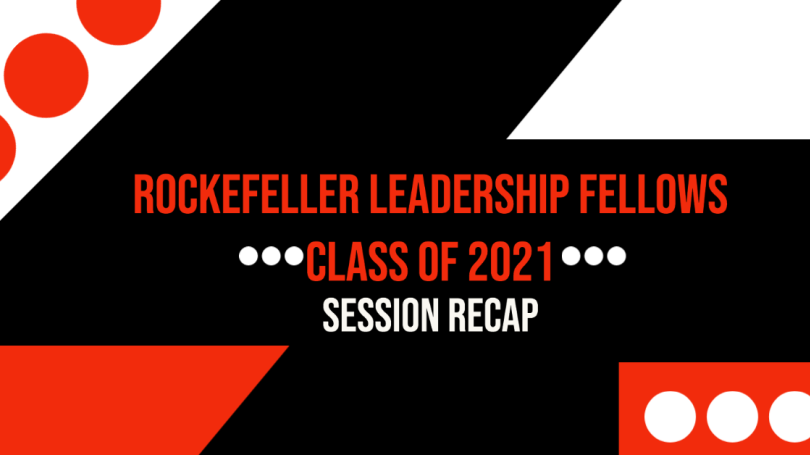
- Public Policy
- Leadership
- Funding
- News & Events
- About the Center
Back to Top Nav
Back to Top Nav
Back to Top Nav
Back to Top Nav
The final fall term session of the Rockefeller Leadership Fellows program, led by Angela Winfield, focused on understanding social identity through the lens of diversity, equity, and inclusion. A woman of many talents, Angela has honed her understanding of the session topic through her many professional experiences, but most notably as the Associate Vice President for Inclusion and Workforce Diversity at Cornell University. So, what is social identity? Social identity is, as defined by Angela, the labels we are assigned and assign others based on visible and invisible traits, which can be fixed or mutable and context dependent. To better illustrate the different types of social identities and their varying levels of visibility, Angela introduced the iceberg metaphor. Some social identities, such as race or gender, tend to be above water–the part of the iceberg that is immediately perceivable. Political leanings, education attainment, and religion are more often underwater social identities and less perceptible. However, some underwater social identities might be made visible. For example, religion can be a visible social identity depending on how someone practices their religion, such as by carrying a rosary or wearing a burka. Angela also reminded the Fellows that social identities can interact and emphasized that all social identities confer varying levels of power. Social identities that confer more power are deemed privileged identities, while social identities with limited power are referred to as marginalized identities.
The Fellows utilized their understanding of social identity after Angela’s introduction to the concept by reflecting on their personal social identities. During this exercise, Fellows commented on the importance of recognizing the intersectionality of identities and the varying levels of power this intersectionality can confer. After these reflections, Angela began to connect the discussion to leadership. “When you hear other people’s experiences,” Angela said, “it shapes your experiences.” A good leader has an understanding of how social identities intersect and impact people and perceptions of leadership. A great leader uses this understanding to promote diversity, equity, and inclusion. The session with Chris Matthews where the Fellows learned about the differences between equality and equity offered additional insight into this discussion. Equity, as Chris taught the Fellows, is an ongoing process and takes consistent, intentional work.
To equip the Fellows with strategies to use their understanding of social identities and overcome the issues that social identities can present, so that the Fellows can effectively promote equity as future leaders, Angela presented four helpful principles via the acronym OPEN. OPEN entails refining your outlook into a more realistic perspective, planning a way to overcome or avoid the obstacle, relying on self-education to provide additional insight, and leaning on your network for support and guidance.
The final take-away that Angela left the Fellows with was the importance of interrogating how organizations and leaders are promoting or hampering equity. Leaders have immense power to define agendas, organize groups, and determine access. Attention to social identities and the power that is associated with those identities can empower a leader to better promote equity, thereby contributing to a healthier and stronger organization.
-Written by Maria Smith-Lopez, Class of 2021 Rockefeller Leadership Fellow and Student Program Assistant
As Rockefeller Leadership Fellows, seniors gain a better understanding of the qualities and responsibilities expected of leaders. As Fellows take part in the workshops, discussions, and team-building exercises, they examine their skills, qualities, and attributes as leaders and analyze how these influence teamwork and achieving goals.